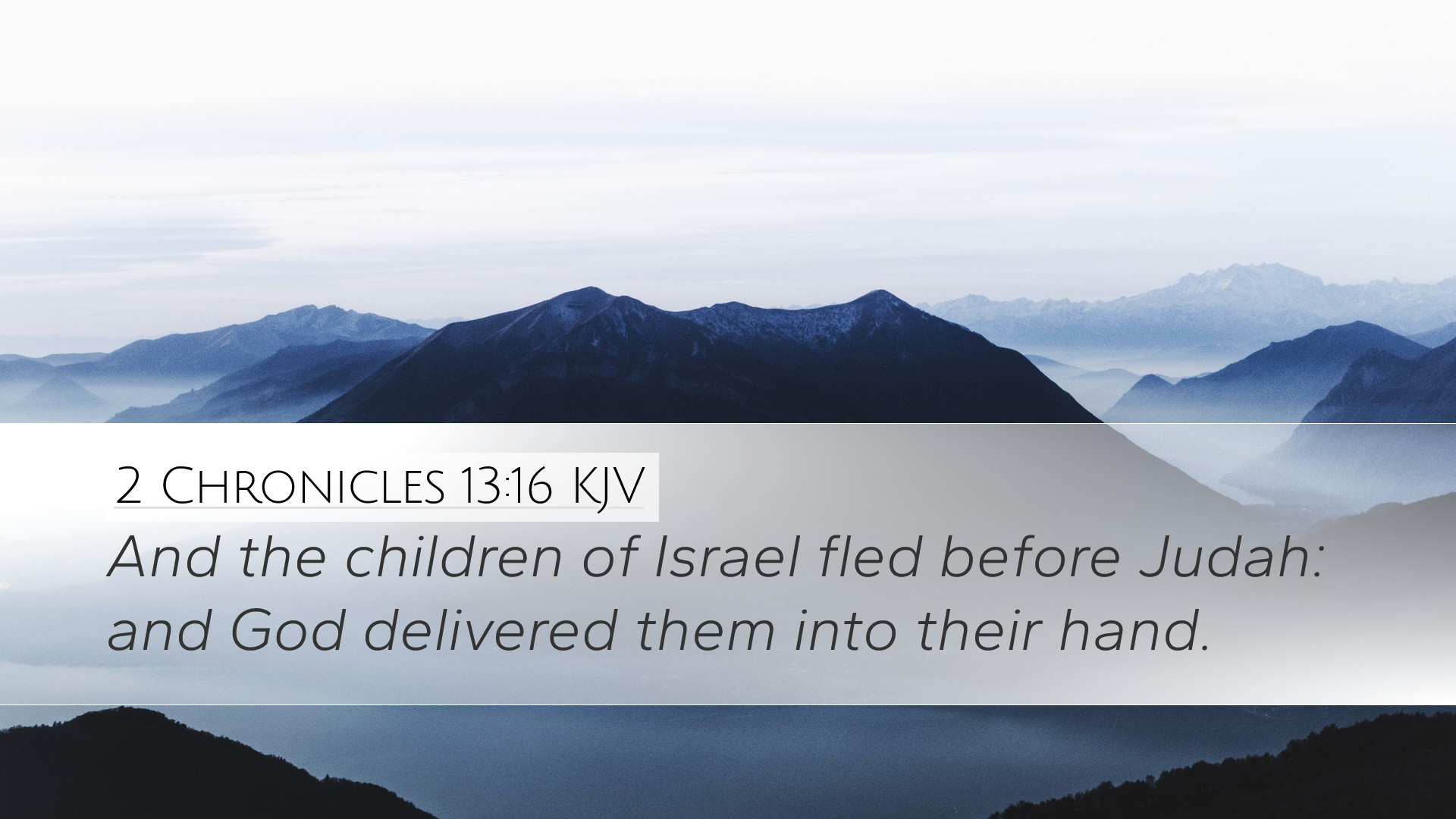Commentary on 2 Chronicles 13:16
Verse: "And the children of Israel fled before Judah: and God delivered them into their hand."
Introduction
The verse under consideration, 2 Chronicles 13:16, depicts a significant moment in the conflict between the kingdoms of Israel and Judah, illustrating a divine intervention in favor of Judah. The context is crucial, as it highlights the overarching themes of faith, obedience, and the sovereignty of God amidst the tumult of Israelite history.
Theological Implications
Theological interpretations highlight that God's favor is not primarily dependent on human merit but on His covenantal faithfulness. The flight of the Israelites symbolizes not just a physical retreat but also a spiritual one from the covenant promises that God had made with His people.
- Covenantal Faithfulness: Both Matthew Henry and Albert Barnes emphasize that this victory illustrates God's faithfulness to His covenant with David, which extends to Judah. This underlines a key theological theme: while rebellion against God brings judgment, loyalty and obedience under divine order lead to victory and deliverance.
- God as Deliverer: Adam Clarke succinctly remarks that this passage serves as a testimony to God's delivering power. The Israelites, once the inheritors of God’s promises, find themselves in a position of defeat, demonstrating how quickly the favor of God can shift.
Historical Context
The backdrop of this verse is crucial for full understanding. The schism between Israel and Judah set the stage for a number of conflicts, yet through this division, God’s sovereignty shines. The kingdom of Judah, led by Abijah, is portrayed as holding on to the rightful lineage of David, contrasting with Jeroboam's Israel, which had strayed into idolatry.
The historical narrative of 2 Chronicles is focused more on Judah's kingship and God's faithfulness in the face of disobedience from the northern tribes. The victory in this battle is not merely a military triumph but a testament to divine endorsement of a lineage that God had chosen.
Lessons for Today
For pastors and theologians today, this verse and its surrounding narrative provide a rich tapestry from which to draw contemporary applications:
- God's Sovereignty: The passage encourages leaders to recognize that victories in life and ministry come not from human strength but from reliance on God's power. It challenges the contemporary church to trust in God's plans above all else, especially when faced with opposition.
- The Importance of Unity: The split between Israel and Judah signifies how division can lead to spiritual disarray. Ministers are reminded that unity in Christ is essential for the church's effectiveness in fulfilling its mission.
- Faithfulness in Leadership: Abijah's leadership is marked by his acknowledgment of God’s role; thus, it encourages current leaders to model their lives on principles of righteousness and dependence on God. Abijah's declaration of faith serves as a reminder of the power of proclaiming God's truth in difficult circumstances.
Moral and Ethical Reflections
As moral and ethical reflections arise from this passage, a few critical points emerge:
- Rebellion brings Consequences: The text underscores the resulting chaos that comes from straying away from God’s commands. Such reflections call believers to examine personal and communal loyalty to divine statutes.
- God's Justice and Mercy: Through the defeat of Israel, there lies a broader narrative of God's justice. Despite divine discipline, there’s an underlying promise that still reflects God’s mercy and ultimate redemptive plan for His people.
Conclusion
In conclusion, 2 Chronicles 13:16 is rich with theological, historical, and practical insights. It exemplifies God’s unwavering promise to His chosen and serves as a powerful reminder of the importance of fidelity to God’s calling. As modern-day believers reflect on this passage, let it invoke a spirit of deep reliance on God's sovereignty, enthusiastic proclamation of faith, and pursuit of unity within the body of Christ.


